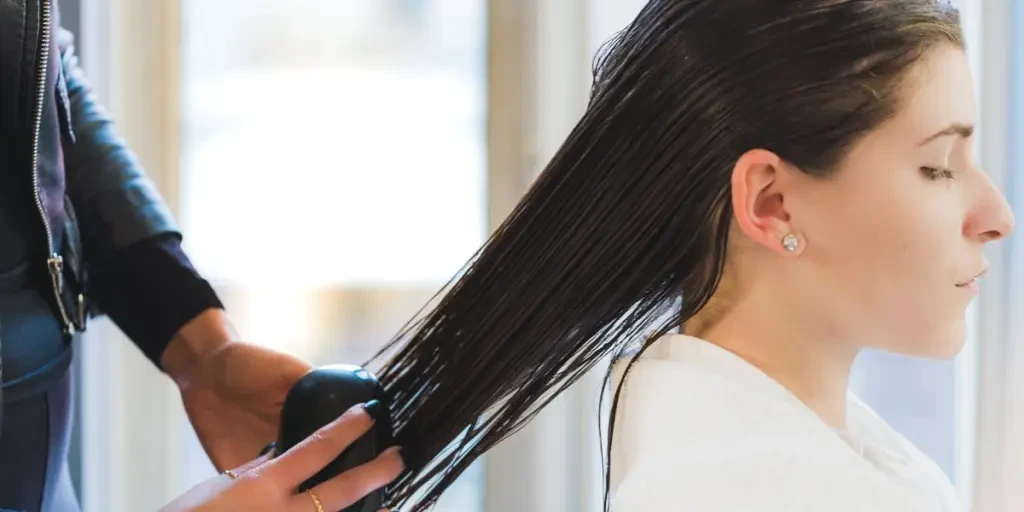Lo shampoo per capelli ha subito una notevole trasformazione nel corso degli anni, evolvendosi da un prodotto detergente di base a una soluzione sofisticata che affronta una miriade di problemi dei capelli. Mentre entriamo nel 2025, il mercato dello shampoo per capelli sta assistendo a una crescita senza precedenti, guidata dai progressi tecnologici, dalle mutevoli preferenze dei consumatori e da una maggiore consapevolezza della salute dei capelli. Questa guida approfondisce la crescente popolarità dello shampoo per capelli, esplorando ciò che lo rende un prodotto di tendenza e analizzando il suo potenziale di mercato e la crescita della domanda.
Sommario:
– Comprendere la crescente popolarità dello shampoo per capelli nel 2025
– Diversi tipi di shampoo per capelli: pro, contro e opinioni dei consumatori
– Affrontare i punti critici dei consumatori con soluzioni innovative
– Fattori chiave da considerare quando si acquista uno shampoo per capelli
– Conclusione: il futuro dello shampoo per capelli nel settore della bellezza
Capire la crescente popolarità dello shampoo per capelli nel 2025

Cosa rende lo shampoo un prodotto di tendenza?
Nel 2025, lo shampoo per capelli è diventato più di un semplice prodotto per l'igiene; è una componente essenziale delle routine di cura personale in tutto il mondo. La crescente prevalenza di disturbi correlati ai capelli, come forfora, caduta dei capelli e sensibilità del cuoio capelluto, ha spinto la domanda di shampoo specializzati. I consumatori sono ora più informati sugli effetti nocivi degli ingredienti sintetici, portando a un'impennata della popolarità degli shampoo naturali e biologici. Secondo un rapporto professionale, si prevede che il mercato globale degli shampoo crescerà da 32.86 miliardi di USD nel 2023 a 41.50 miliardi di USD entro il 2028, con un CAGR del 4.78%.
Anche la tendenza verso prodotti multifunzionali per la cura dei capelli sta prendendo piede. Gli shampoo che offrono molteplici benefici, come idratazione, volume e protezione del colore, sono molto ricercati. Questo cambiamento è guidato dal desiderio dei consumatori di praticità ed efficienza nelle loro routine di cura dei capelli. Inoltre, l'aumento della consapevolezza ecologica ha portato a una maggiore domanda di shampoo con ingredienti clean-label e imballaggi sostenibili.
Analisi del potenziale di mercato e della crescita della domanda
Il mercato degli shampoo per capelli è pronto per una crescita significativa, con diversi fattori che contribuiscono alla sua espansione. Il miglioramento della qualità della vita e l'impatto della cura personale sull'autostima e sulle relazioni sociali sono fattori chiave. Si stima che le dimensioni del mercato raggiungeranno 107.31 miliardi di USD entro il 2029, crescendo a un CAGR del 3.40% dal 2024 al 2029. Questa crescita è ulteriormente alimentata dai progressi tecnologici nelle formulazioni per la cura dei capelli, come nuovi materiali antibatterici, aumento del volume e rilascio controllato di principi attivi.
La regione Asia-Pacifico detiene la quota di mercato più ampia, guidata da un significativo spostamento della popolazione verso le aree urbane e da una maggiore consapevolezza delle pratiche di cura dei capelli. Le collaborazioni tra marchi e celebrità, nonché la crescente domanda di coloranti per capelli, stanno stimolando la crescita del mercato in questa regione. Ad esempio, nell'agosto 2023, The Moms Co. ha lanciato una campagna video digitale con Neha Dhupia per promuovere la sua gamma di prodotti per la cura dei capelli Natural Protein, evidenziando l'influenza delle sponsorizzazioni delle celebrità sulle preferenze dei consumatori.
Influenza dei social media e allineamento più ampio delle tendenze
Le piattaforme dei social media svolgono un ruolo fondamentale nel modellare il comportamento dei consumatori e nel guidare le tendenze nel mercato degli shampoo per capelli. Hashtag come #HairGoals, #NaturalHairCare e #EcoFriendlyBeauty sono di tendenza, riflettendo il crescente interesse dei consumatori per i prodotti per la cura dei capelli naturali e sostenibili. Influencer e beauty blogger sono fondamentali nel promuovere nuovi prodotti e nell'educare i consumatori sui vantaggi dell'uso di shampoo naturali e biologici.
L'allineamento delle tendenze degli shampoo per capelli con argomenti più ampi come bellezza pulita, benessere e sostenibilità è evidente. I consumatori cercano sempre più prodotti che siano in linea con i loro valori, il che porta a un aumento della domanda di shampoo privi di solfati, parabeni e siliconi. Anche l'attenzione per formulazioni e imballaggi eco-compatibili sta guadagnando terreno, con i marchi che investono in ricerca e sviluppo per soddisfare queste aspettative in evoluzione dei consumatori.
In conclusione, il mercato degli shampoo per capelli nel 2025 è caratterizzato da innovazione, sostenibilità e attenzione alla salute olistica dei capelli. Man mano che i consumatori diventano più esigenti e informati, la domanda di shampoo di alta qualità, multifunzionali ed ecologici è destinata a salire alle stelle, presentando opportunità redditizie per le aziende nel settore della bellezza e della cura della persona.
Diversi tipi di shampoo per capelli: pro, contro e opinioni dei consumatori

Shampoo naturali e biologici: ingredienti ed efficacia
Gli shampoo naturali e biologici hanno guadagnato una notevole popolarità nel settore della bellezza e della cura della persona, spinti dalla crescente consapevolezza dei consumatori sugli effetti nocivi delle sostanze chimiche sintetiche. Questi shampoo sono formulati con ingredienti naturali come aloe vera, olio di cocco e oli essenziali, noti per le loro proprietà nutrienti e idratanti. Secondo un rapporto di Research and Markets, la domanda di prodotti per la cura dei capelli naturali e biologici è in aumento, con i consumatori che cercano opzioni più sicure e sostenibili.
L'efficacia degli shampoo naturali e biologici dipende in larga misura dalla qualità e dalla concentrazione degli ingredienti utilizzati. Ad esempio, gli shampoo contenenti alti livelli di aloe vera possono fornire un'idratazione profonda e lenire il cuoio capelluto, mentre quelli con olio di cocco possono rafforzare i capelli e ridurne la rottura. Tuttavia, una delle principali sfide degli shampoo naturali è la loro durata di conservazione più breve rispetto alle alternative sintetiche, poiché spesso non contengono conservanti. Inoltre, alcuni consumatori potrebbero scoprire che gli shampoo naturali non fanno schiuma come quelli convenzionali, il che può influire sull'esperienza complessiva dell'utente.
Nonostante queste sfide, i benefici degli shampoo naturali e biologici, come la ridotta esposizione a sostanze chimiche nocive e la sostenibilità ambientale, li rendono una scelta popolare tra i consumatori attenti alla salute. Marchi come The Himalaya Wellness Company e Klorane hanno sfruttato con successo questo mercato offrendo shampoo con ingredienti biologici e clean-label, soddisfacendo la crescente domanda di soluzioni naturali per la cura dei capelli.
Shampoo senza solfati: vantaggi e feedback dei consumatori
Gli shampoo senza solfati sono diventati sempre più popolari man mano che i consumatori diventano più consapevoli dei potenziali danni causati dai solfati, detergenti aggressivi comunemente presenti negli shampoo convenzionali. I solfati possono privare i capelli dei loro oli naturali, causando secchezza, crespo e irritazione del cuoio capelluto. In risposta, molti marchi hanno sviluppato alternative senza solfati che offrono un'esperienza di pulizia più delicata.
I benefici degli shampoo senza solfati includono una ridotta irritazione del cuoio capelluto, la conservazione degli oli naturali dei capelli e una migliore ritenzione del colore per i capelli tinti. Questi shampoo sono particolarmente utili per le persone con cuoio capelluto sensibile o che hanno subito trattamenti chimici. Secondo il feedback dei consumatori, gli shampoo senza solfati sono efficaci nel mantenere la salute dei capelli e nel ridurre l'effetto crespo, il che li rende una scelta preferita per molti.
Tuttavia, alcuni consumatori potrebbero scoprire che gli shampoo senza solfati non producono tanta schiuma quanto le loro controparti contenenti solfati, il che può essere uno svantaggio per coloro che associano la schiuma alla pulizia. Inoltre, gli shampoo senza solfati potrebbero richiedere un tempo di risciacquo più lungo per rimuovere tutti i residui. Nonostante questi piccoli inconvenienti, l'impatto positivo complessivo sulla salute dei capelli e la crescente consapevolezza dei benefici delle formulazioni senza solfati hanno portato alla loro maggiore adozione sul mercato.
Shampoo specializzati: mirati a specifici problemi dei capelli
Gli shampoo specializzati sono progettati per affrontare specifici problemi dei capelli come forfora, perdita di capelli e protezione del colore. Questi shampoo contengono spesso ingredienti mirati che forniscono benefici terapeutici e soddisfano le esigenze uniche di diversi tipi di capelli. Ad esempio, gli shampoo antiforfora contengono in genere ingredienti attivi come lo zinco piritione o il ketoconazolo, che aiutano a controllare la forfora e a lenire il cuoio capelluto.
Gli shampoo per la caduta dei capelli, d'altro canto, possono includere ingredienti come biotina, caffeina e saw palmetto, che sono noti per promuovere la crescita dei capelli e rafforzare i follicoli piliferi. Secondo un rapporto di Research and Markets, la domanda di prodotti specializzati per la cura dei capelli è guidata dalle crescenti preoccupazioni dei consumatori sulla salute del cuoio capelluto e sul diradamento dei capelli. Marchi come Verb e NatureLab. Tokyo hanno introdotto formulazioni innovative che soddisfano queste esigenze specifiche, offrendo soluzioni efficaci e delicate sui capelli.
Gli shampoo protettivi del colore sono un'altra categoria popolare, pensati per mantenere la vivacità dei capelli tinti e prevenire lo sbiadimento del colore. Questi shampoo contengono spesso filtri UV e antiossidanti che proteggono i capelli dai danni ambientali. La crescente popolarità della colorazione dei capelli e il desiderio di mantenere risultati di qualità da salone a casa hanno alimentato la domanda di shampoo protettivi del colore, rendendoli un punto fermo nelle routine di cura dei capelli di molti consumatori.
Affrontare i problemi dei consumatori con soluzioni innovative

Sfide comuni nella cura dei capelli e soluzioni efficaci
I consumatori spesso affrontano una serie di sfide nella cura dei capelli, tra cui secchezza, crespo, forfora e perdita di capelli. Per affrontare questi problemi sono necessarie soluzioni innovative che soddisfino le esigenze specifiche di diversi tipi e condizioni di capelli. Ad esempio, secchezza e crespo possono essere gestiti efficacemente con shampoo idratanti che contengono ingredienti come olio di argan, burro di karité e glicerina. Questi ingredienti aiutano a idratare i capelli e a lisciare la cuticola, riducendo il crespo e migliorando la gestibilità.
La forfora è un altro problema comune e gli shampoo antiforfora con ingredienti attivi come acido salicilico, piritione di zinco e ketoconazolo possono aiutare a controllare la desquamazione e lenire il cuoio capelluto. Lo shampoo antiforfora di Verb, ad esempio, è formulato con acido salicilico al 3%, che esfolia il cuoio capelluto e riduce la desquamazione, fornendo sollievo dalla forfora dopo un solo utilizzo.
Anche la caduta e l'assottigliamento dei capelli sono preoccupazioni significative per molti consumatori. Gli shampoo che contengono biotina, caffeina e saw palmetto possono aiutare a stimolare la crescita dei capelli e a rafforzare i follicoli piliferi. La collezione SAISEI di NatureLab. Tokyo, che include uno shampoo e un balsamo, è progettata per migliorare la salute del cuoio capelluto e proteggere dai fattori di stress che influenzano la pigmentazione e la crescita dei capelli. Questi prodotti sono arricchiti con ingredienti botanici come mela, bambù ed estratto di rosa alpina, che rinvigoriscono il cuoio capelluto e promuovono una sana crescita dei capelli.
Innovazioni nelle formulazioni degli shampoo per capelli
Il settore della cura dei capelli è in continua evoluzione, con nuove innovazioni nelle formulazioni di shampoo che rispondono a specifiche esigenze e preferenze dei consumatori. Una tendenza degna di nota è l'integrazione della tecnologia di bond building negli shampoo, che aiuta a rafforzare i capelli e a riparare i danni. Lo shampoo secco No. 4D Clean Volume Detox di Olaplex, ad esempio, incorpora la comprovata tecnologia Bond Building del marchio, offrendo benefici sia di pulizia che di rafforzamento in un comodo formato di shampoo secco.
Un'altra innovazione è l'uso di ingredienti naturali ed eco-compatibili nelle formulazioni degli shampoo. I marchi stanno sempre più incorporando estratti botanici, oli essenziali e proteine vegetali nei loro prodotti per fornire soluzioni per la cura dei capelli delicate ed efficaci. Ad esempio, il Detoxifying Shampoo di Commence contiene saponine di saponaria e avena schiumogena, che forniscono una pulizia profonda ma delicata, creando consistenza e densità.
Inoltre, sta guadagnando popolarità lo sviluppo di shampoo multifunzionali che offrono molteplici benefici in un unico prodotto. Questi shampoo possono combinare proprietà di pulizia, condizionamento e trattamento, offrendo una routine di cura dei capelli semplificata per i consumatori indaffarati. Prodotti come Hair-Foam di Bread Beauty Supply, che combina proteine della seta biometriche, cheratina vegana e tecnologia di bond building, esemplificano questa tendenza offrendo sia benefici di styling che di trattamento in un unico prodotto.
Tendenze emergenti nella tecnologia per la cura dei capelli
I progressi nella tecnologia per la cura dei capelli stanno trasformando il modo in cui i consumatori affrontano le loro routine di cura dei capelli. Una tendenza emergente è l'uso dell'intelligenza artificiale (IA) e della realtà aumentata (RA) per migliorare l'esperienza di acquisto online. Queste tecnologie consentono ai consumatori di provare virtualmente diversi colori e stili di capelli, aiutandoli a prendere decisioni di acquisto più consapevoli. Anche marchi come Dyson hanno integrato la tecnologia AI nei loro strumenti per lo styling dei capelli, come l'asciugacapelli Supersonic, che apprende le preferenze di styling degli utenti e ottimizza le prestazioni di conseguenza.
Un'altra tendenza è lo sviluppo di dispositivi intelligenti per la cura dei capelli che forniscono cure personalizzate in base alle esigenze individuali dei capelli. Ad esempio, il Newtiful Hairpod combina tecnologie LED, microcorrente, massaggio del cuoio capelluto e calore per distribuire l'olio per capelli su tutto il cuoio capelluto e i capelli, promuovendo una crescita sana dei capelli e la salute del cuoio capelluto. Questi dispositivi offrono un alto livello di personalizzazione e praticità, rendendoli attraenti per i consumatori esperti di tecnologia.
Anche l'aumento di prodotti per la cura dei capelli ecosostenibili e sostenibili è una tendenza significativa. I marchi si stanno concentrando sempre di più sulla riduzione del loro impatto ambientale utilizzando imballaggi riciclabili, ingredienti biodegradabili e pratiche di approvvigionamento sostenibili. Prodotti come Detangling Tonic Spray di EBB, che utilizza ingredienti completamente naturali e imballaggi ecosostenibili, riflettono questa crescente domanda dei consumatori di soluzioni sostenibili per la cura dei capelli.
Fattori chiave da considerare quando si acquista uno shampoo per capelli

Trasparenza degli ingredienti e standard di sicurezza
Quando si acquistano shampoo per capelli, la trasparenza degli ingredienti e gli standard di sicurezza sono fattori critici da considerare. Gli acquirenti aziendali dovrebbero dare priorità ai prodotti che elencano chiaramente tutti gli ingredienti e rispettano le normative di sicurezza stabilite dalle autorità competenti. I consumatori stanno diventando più informati sugli ingredienti dei loro prodotti per la cura dei capelli e cercano sempre più formulazioni prive di sostanze chimiche nocive come solfati, parabeni e ftalati.
I marchi che enfatizzano la trasparenza e la sicurezza degli ingredienti hanno maggiori probabilità di ottenere la fiducia e la lealtà dei consumatori. Ad esempio, lo shampoo Total Care di Medimix è arricchito con ingredienti naturali ed è privo di sostanze chimiche nocive, il che lo rende una scelta sicura ed efficace per i consumatori. Inoltre, i prodotti dermatologicamente testati e ipoallergenici possono attrarre i consumatori con pelle sensibile o esigenze specifiche per la cura dei capelli.
Considerazioni su imballaggio e sostenibilità
La sostenibilità è una preoccupazione crescente per i consumatori e il packaging gioca un ruolo significativo nelle loro decisioni di acquisto. Gli acquirenti aziendali dovrebbero cercare shampoo che utilizzino materiali di imballaggio eco-compatibili, come plastiche riciclabili, materiali biodegradabili o contenitori ricaricabili. I marchi che adottano pratiche di imballaggio sostenibili possono differenziarsi sul mercato e attrarre consumatori attenti all'ambiente.
Ad esempio, gli shampoo solidi di Lovea sono composti al 97% da ingredienti naturali e sono disponibili in confezioni ecologiche, per soddisfare i consumatori che cercano alternative sostenibili. Allo stesso modo, Kératine Liquide di Evoluderm è formulato con il 98% di ingredienti naturali e utilizza confezioni sostenibili, riflettendo l'impegno del marchio verso la responsabilità ambientale.
Reputazione del marchio e fiducia dei consumatori
La reputazione del marchio e la fiducia dei consumatori sono fattori cruciali quando si acquistano shampoo per capelli. Gli acquirenti aziendali dovrebbero prendere in considerazione marchi che hanno una solida esperienza nel fornire prodotti di alta qualità e mantenere relazioni positive con i propri clienti. I marchi che sono trasparenti sulle loro pratiche di approvvigionamento, elenchi di ingredienti e processi di produzione hanno maggiori probabilità di guadagnare la fiducia e la lealtà dei consumatori.
Ad esempio, L'Oréal e Unilever sono marchi affermati con una reputazione per la produzione di prodotti per la cura dei capelli affidabili ed efficaci. Questi marchi investono molto in ricerca e sviluppo per garantire che i loro prodotti soddisfino le aspettative dei consumatori e aderiscano agli standard di sicurezza. Inoltre, i marchi che interagiscono con i loro clienti tramite i social media e altri canali possono costruire una base di clienti fedeli e migliorare la loro presenza sul mercato.
Conclusione: il futuro dello shampoo per capelli nel settore della bellezza

Il futuro dello shampoo per capelli nel settore della bellezza è plasmato dall'evoluzione delle preferenze dei consumatori, dai progressi tecnologici e da una crescente enfasi sulla sostenibilità. Man mano che i consumatori diventano più informati sugli ingredienti per la cura dei capelli e cercano soluzioni personalizzate, i marchi devono innovare per soddisfare queste richieste. L'integrazione di ingredienti naturali ed ecocompatibili, formulazioni avanzate e dispositivi intelligenti per la cura dei capelli continueranno a far progredire il mercato. Gli acquirenti aziendali dovrebbero dare priorità all'approvvigionamento di shampoo in linea con queste tendenze, assicurandosi di offrire prodotti che soddisfino le diverse esigenze dei loro clienti mantenendo elevati standard di qualità e sostenibilità.





 Afrikaans
Afrikaans አማርኛ
አማርኛ العربية
العربية বাংলা
বাংলা Nederlands
Nederlands English
English Français
Français Deutsch
Deutsch हिन्दी
हिन्दी Bahasa Indonesia
Bahasa Indonesia Italiano
Italiano 日本語
日本語 한국어
한국어 Bahasa Melayu
Bahasa Melayu മലയാളം
മലയാളം پښتو
پښتو فارسی
فارسی Polski
Polski Português
Português Русский
Русский Español
Español Kiswahili
Kiswahili ไทย
ไทย Türkçe
Türkçe اردو
اردو Tiếng Việt
Tiếng Việt isiXhosa
isiXhosa Zulu
Zulu